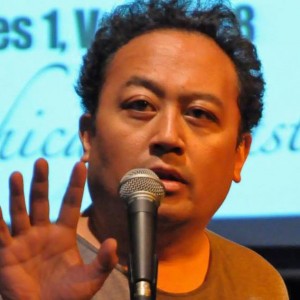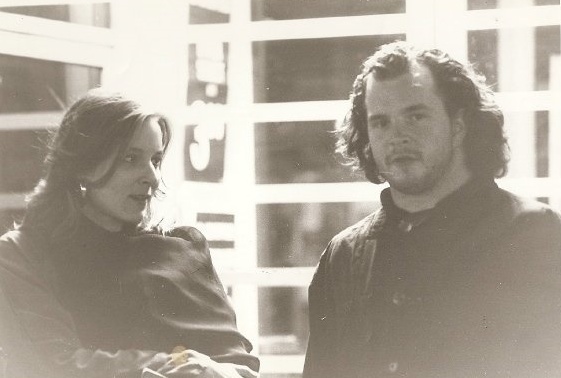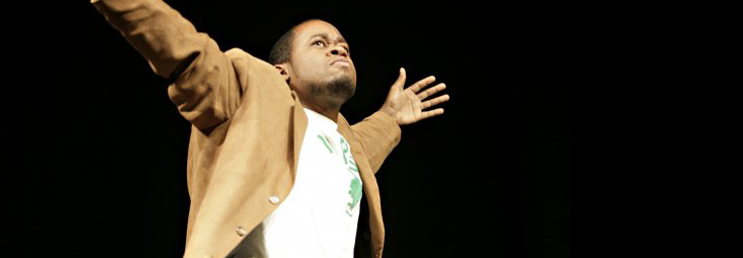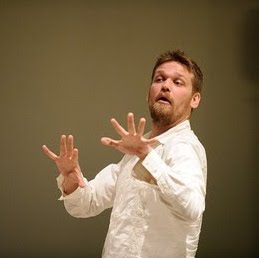Volume 15:4, Fall 2014
A Splendid Wake Issue
In 2006, I returned to my hometown of Washington, DC and arrived to a vibrant spoken word explosion that was superbly supportive and reinventing itself. New arts and literary festivals were emerging amidst the pervading gentrification of the city. Preserving the art of the poetry slam and its history is integral to me. Slam gave me artistic control as a performer who initially wrote poetry of Filipino and gay identity, during the post-AIDS/black box performance art era of New York City.
The poetry slam, like jazz, is an American art form, begun in Chicago by Marc Smith, a construction worker who, in 1984, designed a series that would make a poetry for the people, decided by the people. The slam was a device to lure audiences and poets to a reading. Ultimately, Smith created the competitive art of performance poetry based on numerical Olympic-style scoring, complete with decimal points. The slam has challenged and reinvigorated academia, performance art, and the theater world.
Washington, DC has made several formidable marks on the National Poetry Slam. On August 9, 2014 the Beltway Slam Team took First Prize at the 2014 National Poetry Slam. Perhaps the end of a current wave, or a beginning of a new one, has been marked by this win. A month earlier, the DC Youth Slam team also won First Prize at the Brave New Voices National Youth Slam. The DC team has made it to the finals stage only three times beforein 1994 and 2013, ranking fifth in the nation; and in 2006, ranking fourth. DC also has had two Individual Slam Champions: Sonya Renee in 2004, and Chris August in 2011. Gail Danley, an avid DC/Baltimore Slam Finalist, won the Individual title as well, but she was representing Atlanta in 1994 at that time.
Slam is an ephemeral art form; there is little documentation of the work that has been developed and presented. Starting in the 1990s, way before YouTube and cell phones with video cameras existed, the slam started to migrate from Chicago to Boston, New York and San Francisco. There are few surviving zines, chapbooks or electronic media documenting the genesis of slam. So I have attempted to document the various waves of DC Slam history, to honor and connect the pioneering poets of the genre to the new generation. As someone who was a pioneer of slams early inception at the Nuyorican Poets Cafe and a poet actively involved in the DC slam’s development over the last eight years, documenting this history has become increasingly important to me.
I consider the DC poets who participated from 1993 to 1995 to be the pioneers of the slam genre and members of the First Wave. All share an outrageous sense of humor, experimental language, and affable, quirky personalities. I met Jeffrey McDaniel and Jose Padua while on tour with Lollapalooza and was in awe of DCs performance at the National Poetry Slam in Asheville, NC. I remember McDaniel ripping open his shirt, DJ Renegade (aka Joel Dias-Porter) delivering poems on his knees and Silvana Straw making weird noises like a robot. Renegade and I were finalists in the individual competition. I represented Huntington, Long Island. Members of the DC team from 1993-95 made several New York appearances at the Nuyorican Poets Café and on one infamous night in 1995, they slammed against the Nuyoricans and beat them on their own turf. I have been a fan of their work ever since. Most of the poets of the first wave are still active writers and performers who have a long history of inspiring and nurturing younger poets and artists.
I invited Silvana Straw, DCs Original Slam Champion to write up her memories of the First Wave:
In 1993, I had been active in the performance poetry scene for about ten years. Art Schuhart, who had just started the DC Slam, kept telling me I should come down to the 15 Minutes Club. I decided to check it out one night with Reuben Jackson. At the time, both the performance poetry and burgeoning slam scene were pretty much male-dominated. The seven poets slamming that night were all men. I slayed them. One by one. Several were sore losers. (Violin interlude). I was hooked. Slam was a place where you could feel this great love for all poets and this great desire to kill them all. The DC Slam Team became my brothers. We loved each others poetry, audacity and humor. We challenged each other and grew as artists. When we arrived at the Nationals in San Francisco in 1993, I felt I had found my tribeand was pleasantly surprised to find so many women poets too. I learned from the masters like Patricia Smith, Maggie Estep, Dael Orlandersmith, Tish Benson, Tracie Morris, Carl Hancock Rux, Willie Perdomo, and Hal Sirowitz.
Straw comments on a style that began to develop among slam poets in the mid-90s, saying, The best slam poets are daring and innovative. Unfortunately, by the mid-90s, slam had become a formula. The gold that the master slam poets had brought to the discipline had become lost in a sea of parrots imitating each other. Even more unfortunate, slam style hasnt evolved muchand is too often uninspiring pageantry and painfully predictable.
During that same time, she notes: Slam had also begun to slowly cross over into academia. I got a call in 1996, from my old college professor at American University, Pulitzer-Prize winning poet Henry Taylor. Henry said he heard I was the Slam Champion and wanted to learn about slam and get involved. So we initiated him.
Straw describes herself at that time as being on a mission to build the slam/spoken word community:
I produced the first-ever spoken word/slam events at The Kennedy Center and The Smithsonian and served as organizer for a month-long artistic residency with DC poets and the Nuyoricans. Jeff McDaniel and I started a spoken word series at The Black Cat, showcasing poets from around the country. So much of what informs my work today, I learned from slamhow to write and perform honestly, how to take risks, how to be humble, outrageous, how to laugh at myself and make others laughand how in the end, its about the poem.
The Second Wave of DC slam starts in 1999, after almost four years of no slam team. DJ Renegade, Patrick Washington and Gail Danley formed a team and went to the Nationals. Danley, representing Atlanta, had previously won the Individual Competition, beating DJ Renegade and me in the 1994 Individual Bout; now she was in DC. That same year Nicki Miller and Tobey Debarr became slam masters, starting a wave of slam that would bring Baltimore into collaboration with the DC slam scene. Denise Johnson says:
Nicki and Tobey were instrumental in nurturing and expanding the diversity of poetic voices in DC and beyond. They would invite poets from around the country, as well as connect poets with gigs outside of DC. They had become the LinkedIn of poetry. On any given night, you could have hip hop rapper/poets, goths, academics all in one place, all about the different voices of poetry. [Cafe Myth] was full time, all the time. I think it began to consume their lives (mine too) in such a way, that you had to step away to remember who you were.
Patrick Washington was an emerging force, a self-proclaimed Slam Monster (with heart). In the mid-to-late 90’s, with no Poetry Slam Incorporated (PSI) sanctioned venues in DC, Patrick slammed wherever possible, participating in no less than fifty poetry slams from Florida to New York. By 1999, “fiending” for a national platform, he entered the National Poetry Slam as an indy. Patrick Washington proposed a team to PSI that was “basically a STACKED DC team of Gail Danley, DJ Renegade, and Al Letson. They said Absolutely Not but they’d take us all as indys; I’m sure the only reason I was accepted was because Gail or Renegade vouched for me. Unbeknownst to me, from out of the blue, a group called Cafe Myth was also sending poets to the Nats. I would later become great friends with that group.”
Patrick Washington recalls the memorable highlights for him personally at Cafe Myth and in the 2003 National Slam:
During the 2000 finals at Cafe Myth, devastated upon realizing that I needed an unreachable 31 points to make the DC team, I stepped to the mikethe last poetwith tears running down my face and performed “Fat White Men In Suits” like never before and got a perfectly pitiful 30. 2003 was the most satisfying year, although we didn’t make Semis. We regrouped after a dismal last-place finish in the first round. I will never forget how we tore each other apart outside the venue, walked out on each other, but then came back together, made up, and took first place in our second round.
The Poetry Slam can foster an ugly competitive attitude but ultimately, the DC Slam community has shown a tight-knit, familal mentorship. Washington continues:
I feel blessed to be counted as part of the DC Slam Family in it’s entirety, let alone coming in on the shoulders of such luminaries as Jeff, Silvana, Regie and Renegade. It took me a few months of watching and learning the scene, sitting in the back of places like Club 15 Minutes before working up the nerve to sign myself up. I was terribly undisciplined as a writer, but I was such a fierce performer and freestyler at the time, that I hid my weaknesses well.
Members of the 2000 team, Scott Kirkpatrick, Denise Johnson and Tonya Matthews toured the country in Slam America (a tour from DC to Providence). Johnson says, “It was special because we really caught people’s attention and more poets came to DC to hear the DC voice.
I befriended the endearing Denise Johnson when she read at NYCs Club Nells and slammed against Beau Sia (a fellow Mouth Almighty team poet with me in the 1997 National Slam) and it was a tie! Denise says: “Here I was, a newbie having to compete with Beau, who was getting some press at the time. In the end, I think they declared it a tie, but Beau leaned in and whispered, You know you won, right?”
This period of slam brings a larger racial and sexual-identity diversity to the mix. Sonya Renee became the first National Poetry Slam individual champion in 2004 for the combined DC/Baltimore Team.
The Third Wave came after the loss of Teaism. Nomadic hopping of venues made it challenging to keep the slam in existence. This period is full of major construction. The poets from 2005-2009 have had more years of national exposure and experience than any other team. In 2006, DC/Baltimore got its team onto the final stage but not without controversy. Chris August gives his account of the race to make finals in Austin, when teams representing Albuquerque, New York, Urbana and Hawaii were in striking distance to defeat Slam Charlotte:
DC/Baltimore began the round in last place, meaning that we got to go last in the last round. It was like watching failed pole vaulters: every team leapt for the bar Slam Charlotte had set, and missed and missed and missed. Then, we sent Twain Dooley with Word Up, a poem that spoofs slam conventions. Doing the math: a 28.6 would win us a shot at finals, a 28.5 would tie us with Charlotte. So we found ourselves in extra innings with the most talked about team in the entire competition. Next we decided to play on the predominantly female judges and send up Gail Danley with You Came, a motherhood piece. Charlotte sent up one of their many perfectly choreographed group pieces. We huddled together in the wide, frenzied music venue, and waited to hear the verdict….One vote for DC. One vote for Charlotte. Another DC. Another for Charlotte. The last vote took FOREVER…it was for…DC!!!! And so we got ourselves back on finals stage. Along the way, we got protested by Slam Charlotte for, of all things, our host Jason Carney’s comments about how unfortunate it was to have a tie for first place. Yeah, sometimes its that deep. And so is the way of slam social politics.
The team made temporary homes at R.F.D. Bar, a sports bar in the Chinatown neighborhood, the literary bookstore Politics & Prose in upper Northwest, and The Emergence Collective Art Space in Columbia Heights. This third wave is marred by unenthusiastic venue support and low poet participation.
Finally, in 2010, Delrica teamed up with 2DeepThe Poetess to co-host The 11th Hour Slam. The new venue at Busboys & Poets drew sold-out crowds. This team, which is mostly African American, is fresh off college, with hip hop, rap and political influences a contrast from the First Wave. Most are competing without a cadre of earlier slam veterans to mentor them, having no idea what it takes to strategize and go through team bouts. There is a late-night audience hungry for spoken word art culture and a venue that does not threaten to disappear any time soon. The third wave ended when Baltimore brought its own team to the Nationals and Delrica Andrews led a separate team of dynamic newbies from DC to the slam. Eventually, Delrica bequeathed the 11th hour slam to her co-host; although 2Deep still hosts the series, it is no longer a recognized NPS venue that can bring a team of poets to compete.
The fourth wave was where DC reasserted itself in the national competitive scene in 2011. Sarah D. Lawson, who served as the slam master for DC’s first-ever team to compete in the Southern Fried regional slam the year before, rallied the poets to create a new NPS- recognized venue. At this time, Lawson, Natalie Illum and I also started Capturing Fire, an international slam bringing queer National Poetry Slam champions to DC. Held at The Fridge, a small gallery in the Barracks Row neighborhood, this site also became the inaugural home of the DC Beltway Slam Team. Initially, Sarah D. Lawson, with the assistance of Jonathan B. Tucker and the guidance of Chris August, ran the Beltway Team, sending a representative to the Individual World Poetry Slam (iWPS) in 2011. In this wave, the DC Slam team made it to Fifth Place in the Nationals, matching its record in 1994.
The fifth wave is about to start with the Beltway Slam moving to a Busboys & Poets location in the Brookland neighborhood. Harnessing the energies from the First Wave poets, an electrifying synergy has been re-established between the adult slam team and youth slam poets. This time both teams won first place prizes in their respective competitions.
Sylvana Straw remembers when DC WritersCorps created the first DC Youth Slam in the 90s, and the adult team volunteered to coach the youth. She says: This culture of passing the torch from generation to generation is a testimony of love. This mentorship from adult slam team members was re-established only in the last few years, but has benefitted adults and youth alike, bringing pioneers and young visionaries together to support each other.
When asked to describe the styles of the current slam, Sarah D. Lawson says:
You’d be hard pressed to find a poet who performs in poet voice or who handles a topic in a clichéd way. Instead, many of our poets perform as if they are having a conversation, often making observations on larger issues facing society by tying them in to personal narratives. The Beltway Slam audience brings college students and new DC transplants, along with other poets and organizers. The abyss between the literary and slam worlds is closing, but still at a snails pace here in DC. While many of the poets involved in slam also have high literary accolades, the literary community has yet to completely get on board with slam. I also find the literary world here to be much less diverse than the slam world, and that can be challenging to want to be a part of.
What will this fifth wave that is about to begin be like? The slam has moved from Chinatown through Columbia Heights. I envision new open mics in the Petworth neighborhood as Petworth Citizen, a restaurant/bar opens a bookstore. Other new business impresarios will also capitalize on ventures that incorporate poetry. Washington, DC will be able to support multiple slam teams like San Francisco, New York and Boston. Roscoe Burnems, a 2014 DC Slam Team member, is already linking the Richmond, VA team to DC. Will Baltimore reconnect with DC? Will more DC Youth Slam Team members join the Beltway Slam and bring a new sound? Perhaps transgender, queer voices, poets with disabilities and new immigrant communities will further diversify the slam. More and more poets are seeing Washington, DC as a viable option to become slam “stars.
DC already won the bid to host the 2015 Individual Poetry Slam. Perhaps, in this current wave, the DC Slam will get a regular venue at The White House where Michelle Obama will be a judge or a slam master.
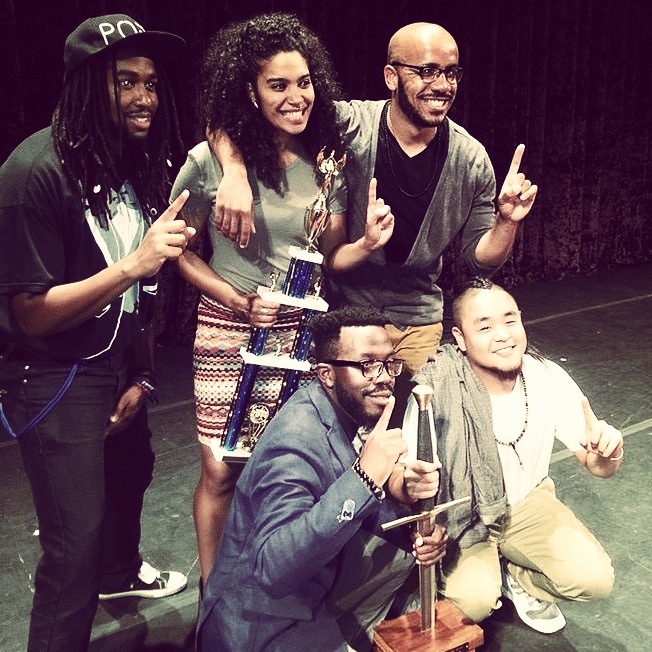
The Beltway Slam Team, just after winning First Place in the 2014 Nationals. From left to right, top row: Roscoe Burnems, Elizabeth Acevedo, Clint Smith. Bottom row: Pages Matam, G. Yamazawa.
Slam Chronology
What follows is a list of all the DC Slam teams. An asterisk after a name indicates a poet who was the DC Slam Champion for that year, or who was the Highest Scoring Poet at the Finals, the local competition leading up to the Nationals.
FIRST WAVE
1993
Slam Venue: 15 Minutes Club , 1030 15th St. NW, McPherson Square neighborhood
Slam-master: Art Schuhart
DC Slam Team: Jeffrey McDaniel, Miles David Moore, Ed Simmons, Jr., Silvana Straw*
National Poetry Slam held in San Francisco, CA
1994
Slam Venue: 15 Minutes Club
Slam Master: Art Schuhart
DC Slam Team: Andy Fenwick, Jeffrey McDaniel, Joel Dias-Porter (aka DJ Renegade), Silvana Straw*
NPS held in Asheville, NC
1995
Slam Venue: The Black Cat, 1831 14th St. NW, Shaw/U Street neighborhood
Slam Master: Art Schuhart
DC Slam Team: Kenny Carroll, Jeffrey McDaniel, Jose Padua, Joel Dias-Porter (aka DJ Renegade)
No official Slam champion recorded. NPS held in Ann Arbor, MI
Slam Venue: 15 Minutes Club
Slam Master: Husain Naqvi, Solo representative: Husain Naqvi
1996
No team
1997
No team
1998
No team
SECOND WAVE
1999
Slam Venue: Cafe Myth, 3241 M Street NW, Georgetown neighborhood
Slam Masters: Toby Debarr and Nicki Miller
Slam Team: Toby Debarr, Jonathan Vaile, Karen Finneyfrock, Edith Gabriela Sanabria.
Alternate: Sam Hurst.
No official Slam Champion recorded. NPS held in Chicago, IL
Gail Danley, DJ Renegade and Patrick Washington entered the Nationals as individuals
2000
Slam Venue: Café Myth
Slam Masters: Toby Debarr and Nicki Miller
DC Slam Team: Denise Johnson, Scott Kirkpatrick*, Tanya Matthews, and Dave Lankford
Alternate: Twain Dooley NPS held in Providence, RI
2001
Slam Venue: Café Myth
Slam Master: Nicki Miller
DC Slam Team: Rich Boucher, Twain Dooley, Denise Johnson*, Patrick Washington
Alternate: David Lankford
NPS held in Seattle, WA
2002
Slam Venue: Teaism, 400 8th St. NW, Penn Quarter neighborhood
Slam Master: Nicki Miller
DC Slam Team: Twain Dooley, David Lankford, Granma Dave Schein, Queen Sheba*
Alternate: Joanna Hoffman
NPS held in Minneapolis, MN
2003
Slam Venue: Teaism
Slam Master: Nicki Miller
DC Slam Team: Chris August, Twain Dooley*, Droopy the Brokeballer, Patrick Washington
NPS held in Chicago, IL
2004
Slam Venue: Teaism
Slam Master: Delrica Andrews
DC Slam Team : Chris August*, Droopy the Brokeballer, Twain Dooley, Sonya Renee
NPS held in St. Louis, MO
2005
Slam Venue: Teaism
Slam Master: Delrica Andrews
DC Slam Team: Chris August, Christian Drake, Sonya Renee*, Kimberley Zisa
Alternate: Jonathan Rechtman
NPS held in Albuquerque, NM
THIRD WAVE
2006
Slam Venue: Emergence Community Arts Center, 733 Euclid Street NW, Pleasant Plains neighborhood
Slam Master: Delrica Andrews
DC Slam Team: Chris August, Gayle Danley, Twain Dooley*, Joanna Hoffman, Rhonda L. Taylor
NPS held in Austin, TX
2007
Slam Venues: R.F.D. Bar , 810 7th St. NW, Chinatown neighborhood, and Politics and Prose Bookstore, 5015 Connecticut Ave. NW, Tenleytown neighborhood
Slam Master: Delrica Andrews
DC Slam Team: Chris August, Twain Dooley, Joanna Hoffman*, Chris Wilson
NPS held in Austin, TX
2008
no DC or DC/Baltimore team
(Baltimore sent a separate team consisting of Kyle Eichman, Twain Dooley, Ryan Mergen, Chris Wilson and Chris August)
2009
Slam Venue: Busboys & Poets, 2021 14th St. NW, Shaw/U Street neighborhood
Slam Master: Delrica Andrews
DC Slam Team: 13 of Nazareth*, 2Deep the Poetess, Tsion the Wordsmith, Jonathan B. Tucker
NPS held in West Palm Beach, FL
FOURTH WAVE
2010
Slam Venue: Busboys & Poets
Slam Master: 2Deep The Poetess
DC Slam Team: Pages D’Matam*, 13 of Nazareth, Rasheed Copeland, Jonathan B. Tucker, Hadaiya Ya-Ya Bey
NPS held in St. Paul, MN
2011
Slam Venue: Busboys & Poets
Slam Master: 2Deep the Poetess
DC Slam Team: Shelly Bell, Hadaiya Ya-Ya Bey*, Rasheed Copeland, Pages Matam, 13 of Nazareth
NPS held in Boston, MA
Slam Venue: The Fridge, 516 8th St. SE, rear entrance, Barracks Row neighborhood
Slam Master: Sarah D. Lawson
Beltway Slam Team: Drew Law, Joseph Green, Twain Dooley, Chris August*
2012
Slam Venue: The Fridge
Slam Master: Sarah D. Lawson
Beltway Slam Team: Drew Law, Twain Dooley, Clint Smith, Pages Matam*
NPS held in Charlotte, NC
2013
Slam Venue: The Fridge
Slam Master: Sarah D. Lawson
Beltway Slam Team: Pages Matam, Robalu Gibsun, Adele Hampton, Clint Smith, Natalie E. Illum*
NPS held in Boston, MA
2014
Slam Venue: The Fridge, and The Dunes, 1402 Meridian Place NW, Mt. Pleasant neighborhood
Slam Masters: Sarah Lawson and Pages Matam
Beltway Slam Team: Elizabeth Acevedo*, G. Yamazawa, Pages Matam, Roscoe Burnems, Clint Smith
NPS held in Oakland, CA
Sources
My thanks to the following individuals for their help in compiling this list: Delrica Andrews, Chris August, Twain Dooley, Denise Johnson, Drew Law, Sarah D. Lawson, Pages Matam, Jeffrey McDaniel, Jose Padua, Kim Roberts, Silvana Straw, Jonathan B. Tucker, Jonathan Vaile, and Patrick Washington.
One of the few written sources for this material is the highly-recommended Lip Smack: A History of Spoken Word in DC by Kim Roberts (Beltway Editions, 2010).
Regie Cabico is a spoken word pioneer, having won the Nuyorican Poets Cafe Grand Slam in 1993 and taking top prizes in the 1993, 1994 and 1997 National Poetry Slams. As a theater artist, he received the 2006 New York Innovative Theater Award for Best Performance Art Production as part of the New York Neo-Futurist's production of Too Much Light Makes The Baby Go Blind. His solo shows have been presented at Dixon Place, Joe's Pub, The Public Theater, Seattle Fringe Festival, Contact Theater (Manchester, England) and The Humana Theater Festival. He is a teaching artist at The Kennedy Center and performs his work throughout North America and the UK. He received several fellowships from the DC Commission for the Arts & Humanities, and the New York Foundation for the Arts. Television credits include NPR's Snap Judgement, and HBO's Def Poetry Jam. His latest solo play, Godiva Dates and One Night Stands, received critical acclaim at the 2013 Capital Fringe Festival. Cabico was a featured poet at the 2016 Split This Rock Poetry Festival. Cabico is co-editor of the anthologies Flicker and Spark: A Contemporary Queer Anthology of Spoken Word and Poetry (Lowbrow Press, 2013) and Poetry Nation: The North American Anthology of Fusion Poetry (Vehicule Press, 1998), and his work appears in the anthologies Short Fuse, Poetry Slam, The Spoken Word Revolution, and Full Moon on K Street: Poems About Washington, DC. He is co-director of the Capturing Fire National Queer Poetry Slam And Summit. To read more by this author: Regie Cabico: Winter 2007; Regie Cabico's Intro to the Split This Rock Issue, Winter 2008; Regie Cabico: Audio Issue; Regie Cabico on DC Slam: Literary Organizations Issue; Regie Cabico: Langston Hughes Tribute Issue.
